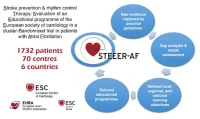A study published in Nature Medicine has demonstrated the clinical value of monitoring heart rate and physical activity using consumer wearable devices by comparing the response to two treatments for atrial fibrillation and heart failure.
The study investigated whether commercially available fitness trackers and smartphones could continuously monitor medication responses and provide clinical information comparable to in-person hospital assessments.
The wearable devices, including a wristband and a connected smartphone, collected extensive data on the response to two medications - digoxin and beta blockers - prescribed in the RATE-AF clinical trial.
Researchers from the cardAIc group at the University of Birmingham led the study, utilising artificial intelligence to analyse over 140 million data points for heart rate in 53 individuals over 20 weeks. They discovered that digoxin and beta-blockers had similar effects on heart rate, even after considering differences in physical activity. This finding differs from previous studies that only assessed the short-term impact of digoxin.
The team developed a neural network that accounted for missing information to ensure a balanced view of the wearable data stream. Their approach revealed that wearables were equivalent to standard tests commonly used in hospitals and clinical trials, which require significant staff time and resources. The average age of participants in the study was 76 years, highlighting the potential value of this technology regardless of age or technological familiarity.
Study researchers point out that people across the world are increasingly using wearable devices in their daily lives to help monitor their activity and health status. This study shows the potential to use this new technology to assess the response to treatment and positively contribute to the routine care of patients.
Heart conditions such as atrial fibrillation and heart failure are expected to double in prevalence over the next few decades, leading to a large burden on patients as well as substantial healthcare costs. This study is an exciting showcase for how artificial intelligence can support new ways to help treat patients better.
The study received funding from the European Union’s Innovative Medicines Initiative as part of the BigData@Heart consortium. The UK National Institute for Health and Care Research funded the RATE-AF trial.
Source: University of Birmingham
Image Credit: iStock










